Google announced an algorithm update intended to rank original news higher. Despite Google’s update, apparently an authority site like Yahoo News can syndicate content and outrank the original.
Google’s Top Stories Ranks Syndicated Content
Syndicated content is original content that is licensed to be republished by another publisher, in this case Yahoo News.
In a perfect world, Google would rank the original site rather than the site that republishes it. But that’s not what Google appears to be doing.
John Shehata, VP of Audience Growth at Condé Nast tweeted that he’s seeing Yahoo News repeatedly ranked top for syndicated content.
This is what he tweeted:
“Recently I see a lot of instances where Google Top Stories ranking syndicated content from Yahoo above or instead of original content.
This is disturbing especially for publishers. Yahoo has no canonicals back to original content but sometimes they link back.”
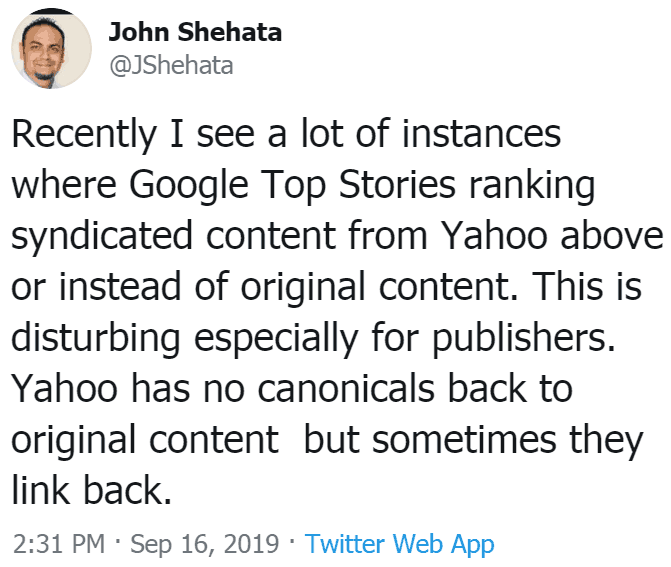
John posted a screenshot of a Rich Results carousel featuring Yahoo content that is syndicated from TheBlast.com.
The screenshot notes:
“Syndicated content from TheBlast.com… They have no AMP, Yahoo is getting all the Top Stores Traffic?”

Another screenshot shows Google’s Top Stories featuring the exact same content, from both the original site and from Yahoo News:

A third screenshot (below) shows Yahoo News outranking Variety, the original content source.
John annotated the screenshot with this comment:
“Yahoo syndicated content outranking original content. Google Top Stories displaying the same exact titles and content!!”
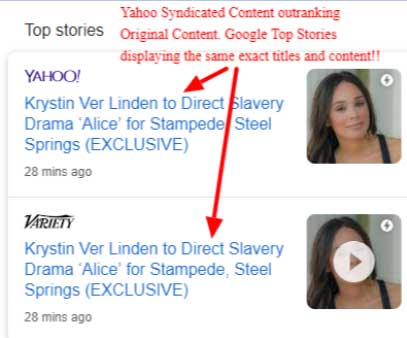
The above screenshot shows that both articles were published simultaneously. Both show a publication data of “28 mins ago” which could be why Google chose to display both articles.
Google’s announcement about “Elevating Original Reporting in Search” stated:
“…we’ve made changes to our products globally to highlight articles that we identify as significant original reporting. Such articles may stay in a highly visible position longer. This prominence allows users to view the original reporting while also looking at more recent articles alongside it.”
Is it possible that the reason Google shows the two identical articles is because one is the original and the other represents “more recent articles?”
Arguably, it may be a poor user experience for Google to show the same two articles.
In that case, which article should Google choose? The original article published on Variety or the more well known and popular site Yahoo News?
Authority Site Outranks Original Site Long Term?
When I search for the title of the original article published by Footwear News, “kim kardashian wears the strappiest black sandals” Google shows Yahoo News at the top of the search results.
Google shows Yahoo News in Positions 1 and 2 for the syndicated content:
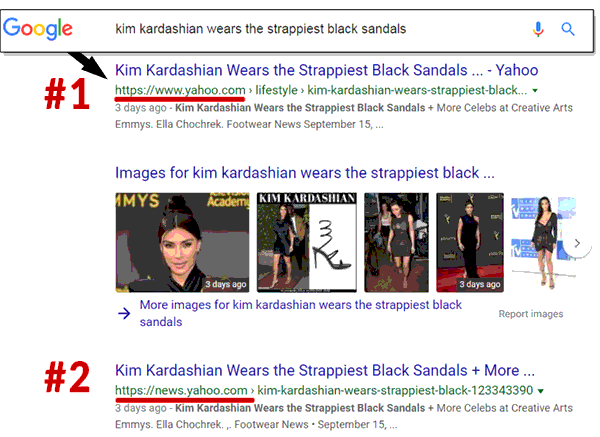
Why is Google Preferring Yahoo News over Original Content?
Is Google’s news algorithm unfair to a small news site? Does Footwear News lack authority and that’s why Google prioritizes Yahoo over the original publisher?
Originality of Image Content
The Footwear News article is original reporting. But the images on that page are not original. The images are licensed from Shutterstock and are not exclusive to Footwear News.
Could the use of multiple licensed images cause Google to show less preference to the small site?
Yahoo News uses one of the same images so that seemingly contradicts the idea that lack of original images may play a role.
Does Google Give Preference to AMP Pages?
Accelerated Mobile Pages (AMP) is a way to serve web pages swiftly to mobile devices.
Yahoo News is served via AMP. Neither Footwear News and TheBlast.com use AMP. Could Yahoo’s use of AMP be the reason Yahoo’s syndicated content is outranking the original news publications?
Structured Data
Footwear News is not using the correct structured data to indicate it is displaying news content.
Running Footwear News’ web page through Google’s structured data checker shows that Footwear News is signaling Google with the more general Article structured data instead of the more specific News structured data.
Require Canonicals for Republished Content
Yahoo News had canonical URLs in their content but the canonical pointed back at Yahoo instead of the original source of the content.
According to Google, determining the original source of a news article in these kinds of situations is difficult. That’s why requiring a canonical that indicates the true original source is helpful for Google and the publisher of the original content.
This is what Danny Sullivan of Google tweeted:
“If people deliberately chose to syndicate their content, it makes it difficult to identify the originating source. That’s why we recommend the use of canonical or blocking. The publishers syndicating can require this.”
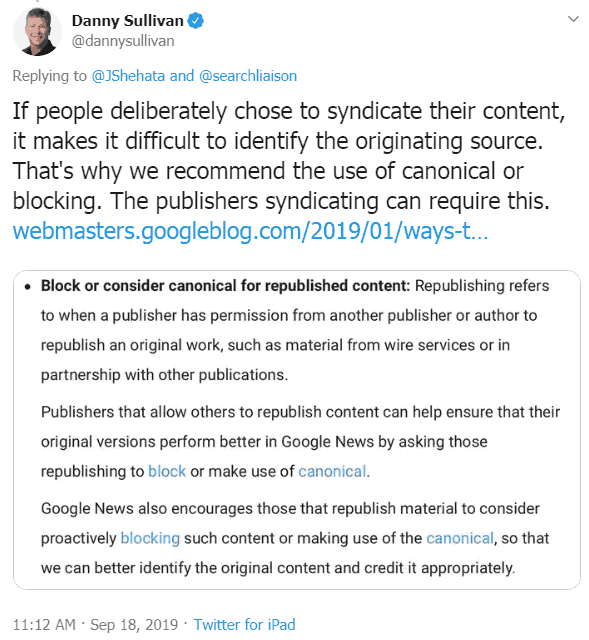
Takeaways
On the surface it appears that Google prefers Yahoo because it is arguably more authoritative and popular than the sites it syndicates content from.
However, according to Google’s Danny Sullivan, giving attribution to the original source of content is difficult.
Danny Sullivan encouraged the use of canonicals to help Google figure out which publisher is the original and which is the syndicated. Do you think it is realistic that Yahoo News would agree to cross-site canonicals?
In the case of Yahoo News, one would think that Google would able to figure out the correct author attribution since the source article is listed right there at the top of each syndicated article.
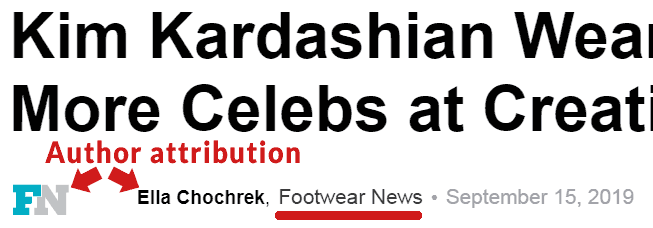 This screenshot of a syndicated article on Yahoo News shows how Yahoo clearly gives author attribution to both the site and the author.
This screenshot of a syndicated article on Yahoo News shows how Yahoo clearly gives author attribution to both the site and the author.That Google gives preference to a large site that is syndicating content seemingly contradicts Google’s recent announcement to elevate original reporting, which can reasonably interpreted as elevating the original article source. But that’s not the case with syndicated content.

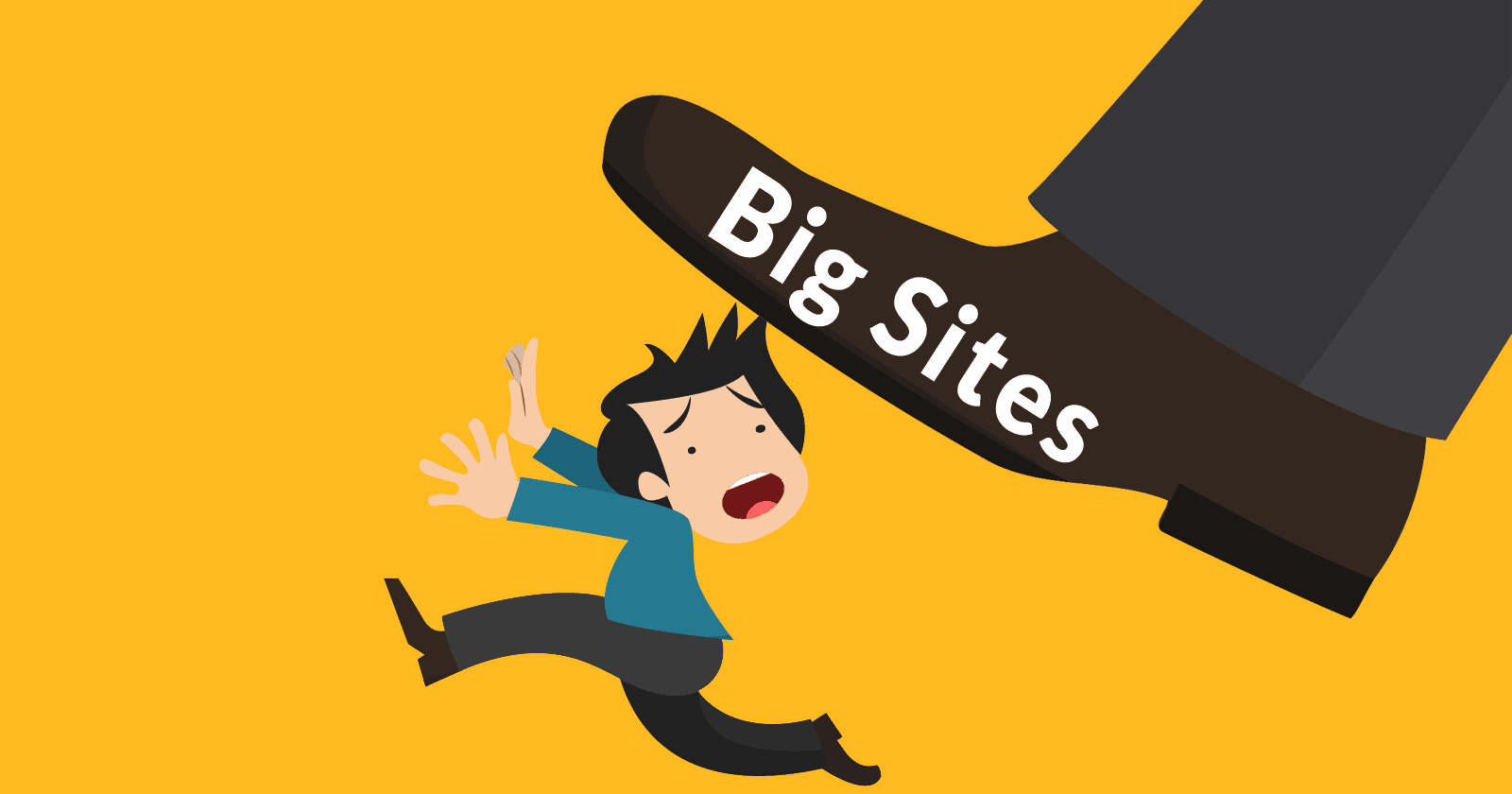



![AI Overviews: We Reverse-Engineered Them So You Don't Have To [+ What You Need To Do Next]](https://www.searchenginejournal.com/wp-content/uploads/2025/04/sidebar1x-455.png)